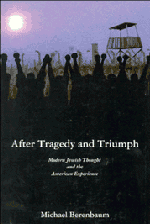Book contents
- Frontmatter
- Contents
- Foreword
- Introduction
- PART I THE HOLOCAUST IN CONTEMPORARY AMERICAN CULTURE
- 1 The Nativization of the Holocaust
- 2 The Uniqueness and Universality of the Holocaust
- 3 Public Commemoration of the Holocaust
- 4 Is the Centrality of the Holocaust Overemphasized? Two Dialogues
- 5 Issues in Teaching the Holocaust
- 6 What We Should Teach Our Children
- 7 The Shadows of the Holocaust
- PART II JEWISH THOUGHT AND MODERN HISTORY
- Notes
- Index
2 - The Uniqueness and Universality of the Holocaust
Published online by Cambridge University Press: 06 January 2010
- Frontmatter
- Contents
- Foreword
- Introduction
- PART I THE HOLOCAUST IN CONTEMPORARY AMERICAN CULTURE
- 1 The Nativization of the Holocaust
- 2 The Uniqueness and Universality of the Holocaust
- 3 Public Commemoration of the Holocaust
- 4 Is the Centrality of the Holocaust Overemphasized? Two Dialogues
- 5 Issues in Teaching the Holocaust
- 6 What We Should Teach Our Children
- 7 The Shadows of the Holocaust
- PART II JEWISH THOUGHT AND MODERN HISTORY
- Notes
- Index
Summary
For more than a decade the debate over the uniqueness and universality of the Holocaust has divided scholars, survivors, and civic leaders on three continents. Israeli historians have vehemently opposed the representation of non-Jewish victims in the U.S. Holocaust Memorial Museum, fearing that this inclusion diminishes the singularity of Jewish fate. In this chapter, I argue that only by discusssing all of the Nazi's victims can the uniqueness of Jewish suffering be convincingly conveyed as a matter of fact rather than a statement of faith. When uniqueness is irrefutable, analogies need not be feared since they cannot be mistaken for equivalents.
Because the Shoah is a novum in Jewish history, an unprecedented event, it has revolutionized faith and politics.
The question of the uniqueness and universality of the Holocaust is being considered with increasing frequency not only in scholarly quarters with a focus on historiography but also in communities throughout the United States where Holocaust memorials and commemorative services raise a consciousness of the Holocaust, which then enters the mainstream of American culture. In the process the word “Holocaust,” shorn of its particular reference along with its article, threatens to become a symbolic word connoting mass murder and destruction whatever the magnitude. The debate over the place of the Holocaust in history is being conducted within the academy, in the streets among ethnic politicians and community leaders, in schools by educators developing curricula, among a cultural elite in literature and the arts, and in religious and philosophical circles.
Perhaps the force of personality, as much as circumstance, has brought the definition of the Holocaust to the fore.
- Type
- Chapter
- Information
- After Tragedy and TriumphEssays in Modern Jewish Thought and the American Experience, pp. 17 - 32Publisher: Cambridge University PressPrint publication year: 1990
- 2
- Cited by



